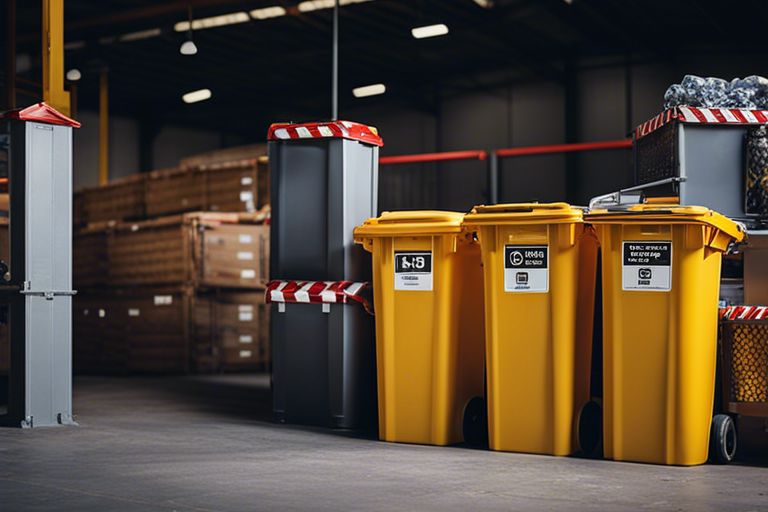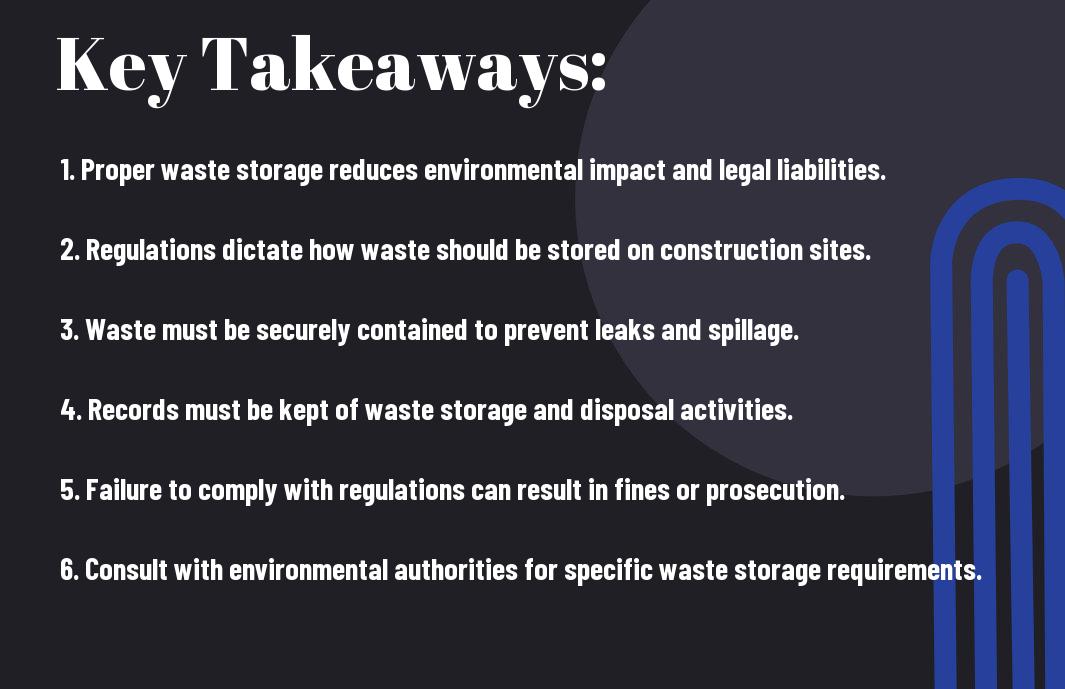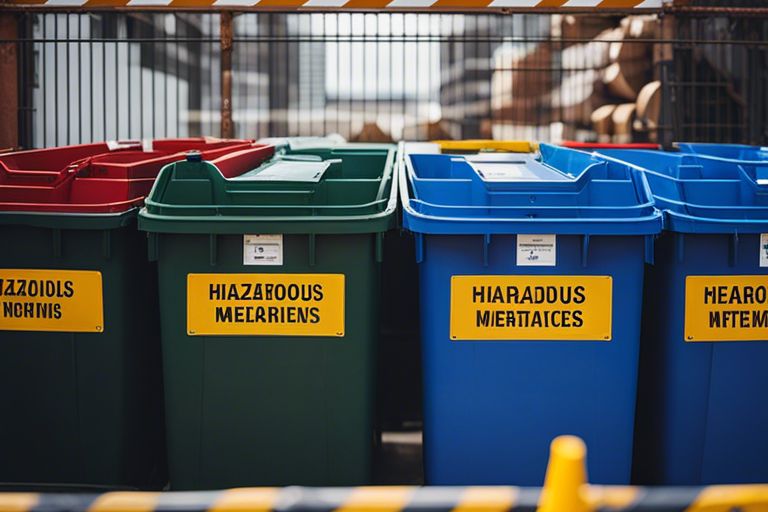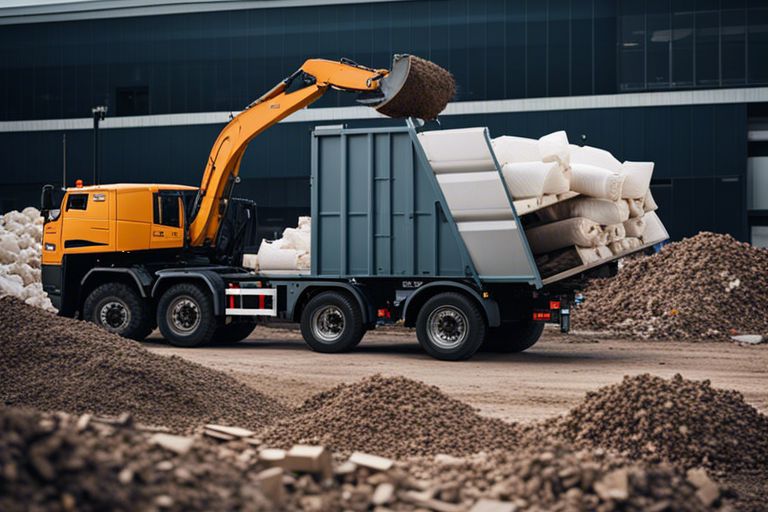Obtaining clear and comprehensive knowledge of the legal obligations surrounding waste management on construction sites is crucial for ensuring compliance and avoiding potential penalties. Failure to comply with the regulations can result in hefty fines and even imprisonment for individuals responsible. It is imperative for construction companies to be aware of their responsibilities in storing waste, including hazardous materials, and to adhere to the regulations set out by the Environment Agency. This informative blog post will outline the legal requirements for storing waste on construction sites, covering the proper disposal of hazardous materials, the necessity of obtaining permits, and the importance of keeping accurate records. By understanding and following these legal requirements, construction companies can contribute to a safer and healthier environment while safeguarding against legal repercussions.
Key Takeaways:
- Legal Obligations: Construction sites must adhere to specific legal requirements for the storage of waste, as outlined in the Environmental Protection Act 1990 and the Construction (Design and Management) Regulations 2015.
- Health and Safety: Proper waste storage is crucial for maintaining a safe and healthy working environment. Failure to comply with regulations can result in fines and legal action.
- Environmental Impact: Effective waste storage and management on construction sites is essential for minimising the environmental impact of construction activities, including pollution and resource depletion.


Legal Framework for Waste Storage
When it comes to storing waste on construction sites, it is crucial for businesses to adhere to the legal framework set out by federal, state, and local authorities. Failure to comply with these requirements can result in heavy fines, legal action, and damage to the environment.
Federal Regulations
Construction companies must be aware of the regulations set by the Environment Agency and Health and Safety Executive. These bodies ensure that waste is stored and disposed of in a manner that does not pose a risk to human health and the environment. It is essential for businesses to obtain the necessary permits and licenses to handle and store waste materials in accordance with the law.
State and Local Compliance Requirements
In addition to federal regulations, construction companies must also comply with state and local government laws regarding waste storage. This may include obtaining permits, following specific waste management plans, and adhering to zoning ordinances. Non-compliance with these requirements can lead to severe penalties and disruption to construction projects.
It is important to note that some states have stricter regulations than others, so it is vital for businesses to familiarise themselves with the specific requirements of the area in which they are operating.
Types of Waste and Storage Solutions
When it comes to construction sites, waste management is a crucial aspect that cannot be overlooked. Different types of waste require different storage solutions to ensure compliance with legal requirements and to minimise environmental impact.
- General Waste
- Recyclable Waste
- Hazardous Waste
- Non-Hazardous Waste
- Organic Waste
The General Construction Site Waste Management guidelines provide a comprehensive overview of the types of waste commonly found on construction sites and the recommended storage solutions for each.
| Waste Type | Storage Solution |
|---|---|
| General Waste | Skips or containers |
| Recyclable Waste | Separate collection bins |
| Hazardous Waste | Specialist storage units |
| Non-Hazardous Waste | Secure containers |
| Organic Waste | Composting facilities |
Hazardous Waste Handling
When it comes to hazardous waste on construction sites, proper handling is essential to avoid harm to workers and the environment. It is crucial to have designated storage areas and to follow strict health and safety guidelines.
Non-Hazardous Waste Management
Managing non-hazardous waste on construction sites involves implementing efficient storage and disposal methods to prevent environmental contamination. Utilising recycling initiatives can also contribute to reducing the overall amount of waste produced.
It is important to conduct regular audits to monitor the waste management process and ensure compliance with regulations. Regular training and awareness programs for site personnel can also help in promoting sustainable waste management practices.

Best Practices for Waste Storage and Record Keeping
When it comes to managing waste on construction sites, it is crucial to follow best practices for waste storage and record keeping. Properly storing waste and maintaining accurate records not only ensures compliance with legal requirements but also contributes to a safe and sustainable working environment.
To learn more about hazardous waste, please visit Hazardous Waste section on our website.
Designing a Waste Storage Plan
Designing a waste storage plan is a critical step in ensuring that waste is managed efficiently and safely on construction sites. This plan should consider the type and quantity of waste generated, the necessary storage infrastructure, and the handling procedures. Proper segregation of hazardous and non-hazardous waste is essential to prevent contamination and ensure the safety of workers and the surrounding environment.
Additionally, regular inspections and maintenance of storage facilities should be conducted to identify and address any potential hazards or inefficiencies in the waste storage process.
Required Documentation and Logs
Accurate documentation and logs are key to demonstrating compliance with waste management regulations. This includes maintaining records of waste generation, storage, transportation, and disposal. Clear labelling and documentation of hazardous waste is particularly important to prevent accidental exposure and ensure safe handling.
Furthermore, training and communication of waste management procedures to all personnel involved in the construction project is vital to ensure that the necessary documentation and logs are accurately maintained.
It is important to note that failure to comply with the required documentation and record-keeping regulations can lead to severe legal consequences and environmental harm. Therefore, it is imperative for construction companies to prioritise the implementation of effective waste management practices and documentation processes.
Enforcement and Penalties for Non-Compliance
When it comes to the legal requirements for storing waste on construction sites, it is crucial to understand the enforcement measures and penalties for non-compliance. The governing authorities have the power to carry out regular inspections and audits to ensure that construction sites are adhering to the regulations. Failure to comply with these legal requirements can result in severe consequences, including hefty fines, legal action, and even suspension of operations.
Inspection Protocols
Inspection protocols for waste storage on construction sites are designed to ensure compliance with legal requirements. Inspectors will assess the storage areas, waste disposal methods, and overall waste management practices to identify any areas of non-compliance. It is essential for construction site operators to maintain detailed records of their waste management processes and to be prepared for unannounced inspections at any time.
Consequences of Failing to Meet Legal Standards
Failure to meet the legal standards for storing waste on construction sites can have serious repercussions. Non-compliance can lead to significant fines, legal action, and reputational damage for the construction company. Additionally, it can result in disruption to project timelines and increased costs, as corrective measures will need to be implemented to bring the site into compliance with the regulations.
Construction companies must prioritise compliance with waste storage regulations to avoid these detrimental consequences and to demonstrate corporate social responsibility in their operations.
The Legal Requirements for Storing Waste on Construction Sites
It is imperative for construction companies to understand and adhere to the legal requirements for storing waste on their sites. Failure to comply with these regulations can result in significant fines and legal repercussions. By ensuring compliance, companies not only avoid penalties but also contribute to environmental safety and sustainability. The Federal Environmental Requirements for Construction, as outlined by the Construction Industry Compliance Assistance Center, provide a comprehensive guide to the regulations that must be followed. It is essential for construction companies to familiarise themselves with these requirements and implement appropriate waste management practices to maintain a safe and compliant work environment. By doing so, they can demonstrate their commitment to environmental responsibility and avoid potential legal issues.
Federal Environmental Requirements for Construction
FAQ
Q: What are the legal requirements for storing waste on construction sites?
A: The legal requirements for storing waste on construction sites are governed by the Environmental Protection Act 1990 and the Waste (England and Wales) Regulations 2011. These regulations require construction sites to properly store and manage all waste materials to prevent environmental harm.
Q: What type of waste materials are covered under these legal requirements?
A: The legal requirements cover a wide range of waste materials, including construction debris, hazardous waste, and general waste produced during construction activities. It is essential for site operators to segregate, store, and dispose of these materials in accordance with the regulations.
Q: What are the key responsibilities of construction site operators in managing waste?
A: Construction site operators are responsible for developing and implementing a waste management plan, ensuring proper segregation and storage of waste materials, and arranging for the lawful disposal of waste through licensed waste carriers or facilities. They must also keep accurate records of waste management activities.
Q: What are the potential consequences of non-compliance with the legal requirements for storing waste on construction sites?
A: Non-compliance with the legal requirements can result in financial penalties, legal action, and damage to the environment. Site operators may face fines or prosecution for failing to comply with the regulations, and their reputation within the industry may suffer as a result of environmental harm caused by improper waste management.
Q: How can construction site operators ensure compliance with the legal requirements for storing waste?
A: Construction site operators can ensure compliance by staying informed about the latest regulations, implementing robust waste management practices, providing adequate training to staff, and engaging with reputable waste management contractors. Regular monitoring and review of waste management activities are also essential to maintain compliance.







